On this day, our Gospel reading begins on the evening of that first Pascha, the evening of the Day our Lord Jesus arose from the dead. The disciples were gathered together and the doors were shut and locked – they were afraid of what the authorities might do to them. Their Master had been arrested, tried, executed… perhaps the police were looking for them, as well.
And something amazing and astounding happens. Jesus enters into the midst of their fear, their terror… This is not a ghost, a hallucination – he shows them his hands and his side. This is the crucified One who has been raised from the dead… Imagine what the past few days had been like for them: the last supper together on Thursday, followed by long time of prayer in the Garden of Gethsemane… then the demoralizing pain and anguish of Great and Holy Friday. With only a few exceptions, the disciples had fled in terror and confusion.
But now, Jesus has come to them and he speaks words of peace. He brings healing to troubled hearts and minds. Their terror is transformed to joy – they are glad to see their Lord. Then Jesus speaks another word to them, another word of Peace. The first word was calming and healing; this second word is a commission. We’re going to hear more about this: Jesus commissions his disciples at his Ascension. Then at Pentecost, when the Holy Spirit descends upon them, they will be commissioned to go forth into all the world to proclaim the Gospel. But even before all that, on this Pascha evening, Jesus breathes the Spirit upon them and gives them a much more modest, fundamental assignment: they are to practice forgiveness. With these words of peace and forgiveness, Jesus is rebuilding, reconstituting the fellowship of his disciples that was unraveled by the events of Holy Week. But now, re-gathered with Christ in their midst, they are given peace and the power and opportunity to forgive.
Today is known as Thomas Sunday, because
This has earned him the title, “Doubting Thomas.” We live in a world that makes a great deal of skepticism: to be a doubter, or an agnostic, is to be a kind of intellectual hero. The so-called conflict of religion and science is emphasized again and again: you may have seen or heard about the very popular recent books by Sam Harris and Richard Dawkins which are angry, atheistic attacks on traditional belief, on traditional faith. Sometimes you’ll even see
That’s not a very good reading of this Gospel story. Several points need to be emphasized. The disciples believe when they’re given something to believe. They don’t just believe anything and everything – they’re not gullible. They’re hiding behind locked doors because they’re smart. They know what happened to Jesus, and they’re wise enough to know that that’s probably going to happen to them, too. Jesus comes to them, appears to them, and when they see that it’s him, nail scars and all, then they believe.
And although Thomas isn’t there, he isn’t any different. He has to be given something to believe. And he has a pretty good sense of what it will take. If he’s going to believe, then it has to be Jesus – and not just the idea of Jesus, but the Risen Jesus with nail-scarred flesh. Nothing else, no one else, will satisfy. Thomas was exercising what some have called “provisional doubt.” He was willing to believe, but if and only if it were true.
And by grace, Jesus comes to him. Our Lord speaks the same words of peace, and offers Thomas to look and to touch, to verify the reality of what he’s seeing and hearing: place your finger in the nail prints, place your hand in the spear-wound on My side… Verify! It’s true! Believe! And Thomas did believe. He responds with veneration, with worship: “My Lord and my God!”
Jesus praises him, but then speaks words of blessing to those of us who do not see, and yet believe. We don’t see the Risen Christ the way Thomas and the others did, and yet we have their testimony. We have the Scriptures, the teachings of the Church enduring through time. We have what we have been given – that we, too, may believe.
Perhaps the most striking thing for me about this passage is the invitation for Thomas to touch. Touch is important, feeling is important. I’ve been told by people who have recently lost a loved one – a parent, a spouse, a child – that what they miss most is the ability to touch, to reach out and grasp the one they love. I’ve heard others say that the almost pathological obsession that some people have with multiple body-piercings, even with cutting themselves, concerns an overwhelming need and desire to feel something, anything. They desperately want to touch and be touched, to grasp, to take hold of something. Touch matters.
That may be why touch is so important in our worship of God: when we welcome one another, we grasp hands (or more traditionally, we embrace and kiss – three times!). When we venerate the icons, we touch them with our lips, kissing them. When we’re Baptized or Chrismated, we’re immersed in water and anointed with oil. When we receive the Eucharist, the sacred Body and precious Blood of our Lord touches our lips, and we often then kiss the chalice which holds the mystery. Touch matters. It connects us with something, someone, other than ourselves. It reminds us that we’re not alone.



<< Home